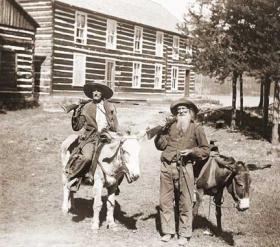Washington Irving wrote "There is, perhaps, no class of men on the face of the Earth who lead a life of more continued exertion, peril and excitement, and who are more enamored of their occupations, than the free trappers of the West".
The diet of the mountain men at times consisted of nothing more than meat. When possible. wild plants and berries supplemented needed vitamins. Pemmican, a meat pounded with fruits and dried in flakes, was convenient to carry and lasted a long time. Mountain men made boudins, sausage made from the intestines of newly killed animals. These sausages were packed full of undigested grasses which probably protected the mountain men from the illness of scurvy. The mountain men also chewed on leaves and wild grasses to supplement their vitamin needs. Potatoes soaked in vinegar supplied further balance to the diet. Jams and orange marmalade were highly valued whenever they could be obtained. Bread consisted almost entirely of hardtack, a touch cracker usually unsalted, which would not spoil and sturdy enough not to crumble.
Beaver tail soup was considered a delicacy by most mountain men. Another treat was called "French dumplings", made by mincing buffalo hump with marrow, rolling it into balls, and covering with flour dough and boiled. Coffee was popular, but limited for transport. Tea from China came in solid blocks which could be shaved off as needed.
Normally, mountain men could not carry whiskey on the move but at rendezvous or during visits to forts, they were known as fabulous drinkers. The most common intoxicant in those days was "Taos Lightening", a strong whiskey manufactured by Simeon Truly of Taos New Mexico. Various writers have portrayed these men as brutes who lived from one drunken episode to the next, but the facts, and common sense contradict that image. They could not achieve much in either trapping or trading if they did not stay focused on their outdoor skills and survival.
Smoking pipes was a luxury, mostly at nights as only a limited amount of tobacco could be obtained. The mountain men would stretch their tobacco supplies by mixing it with kinnick-kinnick and other plants.
While many traders and trappers dressed in buckskin shirts and trousers, wool garments were even more common and needed to be shrunk to fit. Probably every mountain man carried what was called a "possibilities bag" that contained personal items such as a pipe, tobacco, soap, needles, and small keepsakes such as mouth-harps.
Before the Sharps "Big 50" rifle was invented, it was necessary to carry a waterproof powder horn and a bag of rifle balls weighing fifty to a pound. A good knife was essential. The most sought after of these was the Bowie Knife, invented by Rezin Bowie, but made famous by his brother Jim, who was adept at its use. Jim was one of the heros killed at the Battle of the Alamo in Texas.
Some mountain men simply loved the lifestyle and had no reason to return to their original homes. Some had wives back in St. Louis and made an annual trek there every year. Others had Indian wives or female companions. Some men claimed to have a wife in every tribe they visited. Divorce within many tribes was often simple, a matter of putting one's belongings outside the lodge.
As journeys by foot or horse were lonely, mountain men were known to play their mouth harps or sing songs along the trail. The use of profanity was common, except in the presence of white ladies. One writer claimed the Indians called white men "Godams" because that swear word was used so frequently by the mountain men, ranch hands and mule skinners.
Washington Irving, Adventures of Captain Bonneville, USA; New York, 1837
Samuel Bowles, The Switzerland of America, Springfield MA, 1869
Michael Durham, Desert Between the Mountains, New York, 1957
Walter O'Mera, Daughters of the County: The Women of the Fur Traders and Mountain Men, New York, 1968
Candy Moulton, A Writers Guide to Every Day Life in the Wild West, Cincinnati, OH 1999
George Ruxton, Life in the Far West, Norman OK 1961
Robert Glass Cleland, This Reckless Breed of Men, New York, 1944
Rufus B. Sage, Scenes in the Rocky Mountains, Cleveland, 1846
Rufus Rockwell Wilson, Out of the West, Elmira, NY, 1940
Peter Watts, A Dictionary of the Old West, New York, 1977
Vardis Fisher, Mountain Man, Moscow, ID 200








